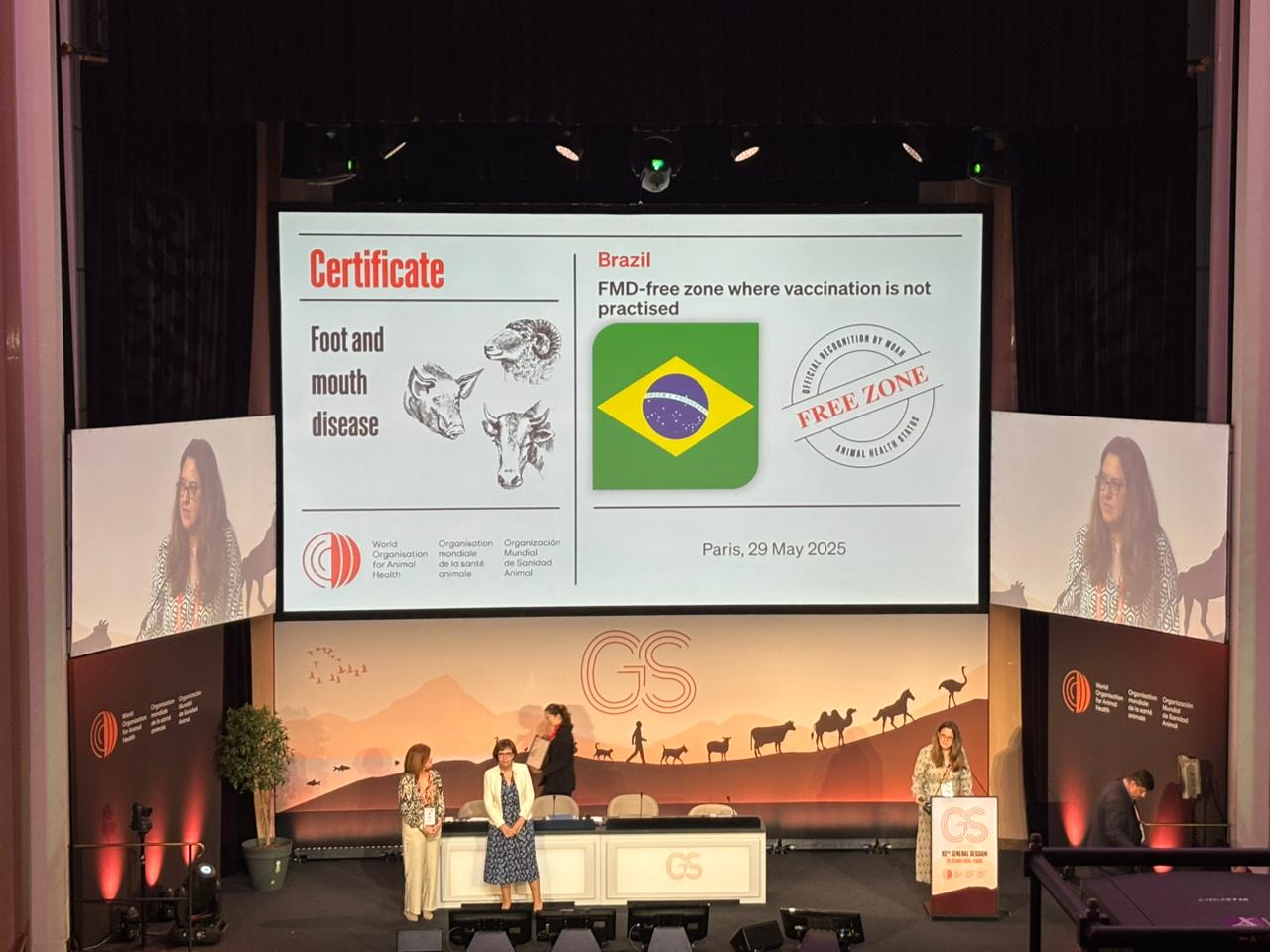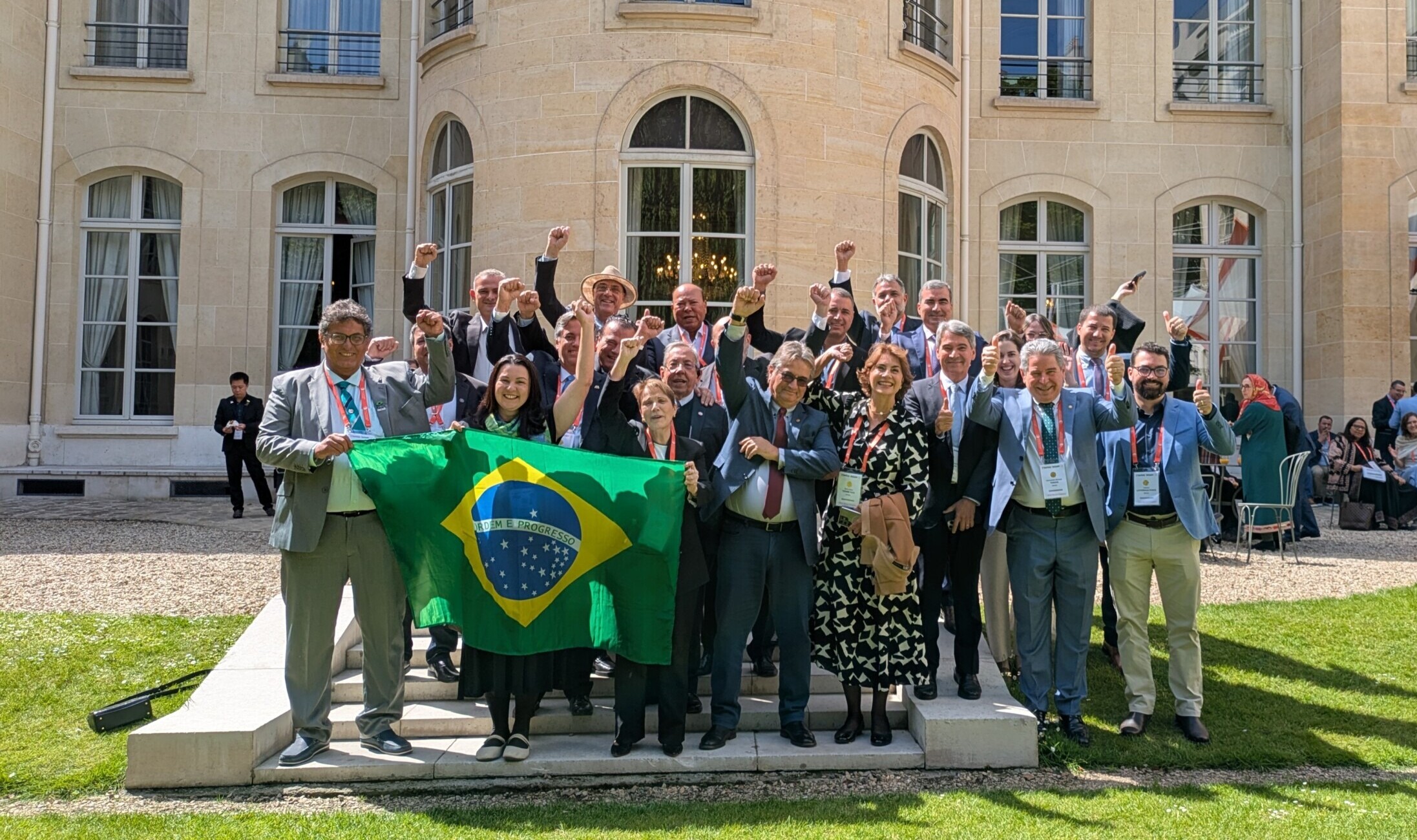Brazil received a new health status from the World Organization for Animal Health (WOAH) on Thursday (May 29). The country is now officially recognized as free from foot-and-mouth disease without vaccination. The certificate confirming the new health status was presented to Marcelo Mota, Director of Animal Health at the Ministry of Agriculture and Livestock (Mapa), during the 92nd General Session of the WOAH World Assembly of Delegates, held in Paris.

The Brazilian Confederation of Agriculture and Livestock (CNA) said the certificate represents a historic achievement for Brazilian livestock farming, which will reduce costs for producers, expand market access for meat, and help the country’s economy.
According to João Martins, president of the Brazilian Confederation of Agriculture and Livestock (CNA), the new sanitary status is the result of years of campaigning and a joint effort involving livestock farmers, federations, unions, states, governments, and public policies aimed at eradicating the disease from herds across the entire national territory.
“Today’s announcement, declaring Brazil free of foot-and-mouth disease without vaccination, is a recognition of this effort—an enormous achievement. More than ever, Brazil can now sell meat, a product of the highest quality, to any country in the world.”
For CNA’s vice president, Gedeão Pereira, the recognition is an important milestone for Brazilian livestock farming and brings even greater responsibilities to the public and private sectors, and especially to rural producers, who are the true protagonists of this progress.
“The entire meat sector benefits from this achievement. We must take even better care of our herds. The international market demands quantity, speed, and quality in food supply,” stated Gedeão.
Senator Tereza Cristina emphasized that earning the certificate was a long-term achievement built by many hands, and she expressed gratitude to all involved in the process of eradicating and monitoring foot-and-mouth disease. “Today is a historic day, filled with emotion and deep gratitude to everyone who played a part in achieving this certification.”
She also highlighted the need to keep working to maintain the status declared by the WOAH (World Organisation for Animal Health). “Rural producers now gain a different status, enabling access to more demanding markets that pay more for beef—and which would be inaccessible without this recognition.” The senator concluded by saying, “Brazil will continue on the path of high-quality beef production, making a difference.”
Marcelo Bertoni, president of Famasul (Federation of Agriculture and Livestock of the State of Mato Grosso do Sul), stated that this international recognition shows that Brazil is a conscious, responsible producer that respects the environment. “This status reinforces the quality of our beef and can open new markets for rural producers.”
During the Assembly, WOAH also awarded Bolivia certification as a country free of foot-and-mouth disease without vaccination. According to CNA, the eradication of the disease in South America makes it safer and easier to phase out vaccination, given Brazil’s extensive border area.

Combined efforts – Disease eradication in Brazil and international recognition are the result of joint efforts between the government and the private sector, as well as coordinated actions to gradually phase out the vaccine, following the Strategic Plan of the National Foot-and-Mouth Disease Surveillance Program (PNEFA).
CNA explains that the vaccination withdrawal process was conducted safely, based on the progress made by states in meeting minimum requirements. As part of the ten-year PNEFA implementation period (2017–2026), seroepidemiological studies showed no evidence of virus circulation in the country.
It is worth noting that these studies are a mandatory requirement to apply for recognition as a foot-and-mouth disease-free zone without vaccination from the World Organization for Animal Health.
Before the announcement, Brazil had two zones recognized as free of the disease without vaccination. The first included the southern states (Paraná, Santa Catarina, and Rio Grande do Sul), and the other included the states of Acre, Rondônia, and parts of Amazonas and Mato Grosso.
Surveillance – Even though vaccination is being phased out, Brazil will continue with its herd surveillance and health control measures. CNA reinforces the importance of the role of cattle farmers and their employees, who are on the front line and have a responsibility to notify the Official Veterinary Service (SVO) in the event of symptoms of the disease in animals.
This surveillance work is further enhanced by the individual traceability of cattle and buffalo. CNA and state agriculture and livestock federations worked together to develop a proposal for the sector, which served as a basis for the National Plan for the Individual Identification of Cattle and Buffalo (PNIB).
The transition from the current model, which is based on batches, to individual identification will help speed up investigations of suspected cases of the disease and responses to international buyers.